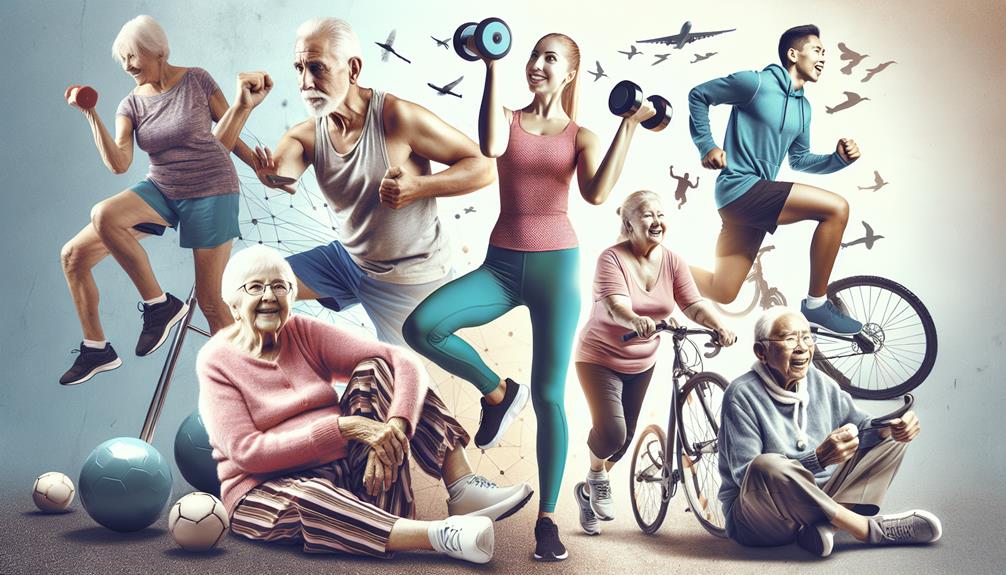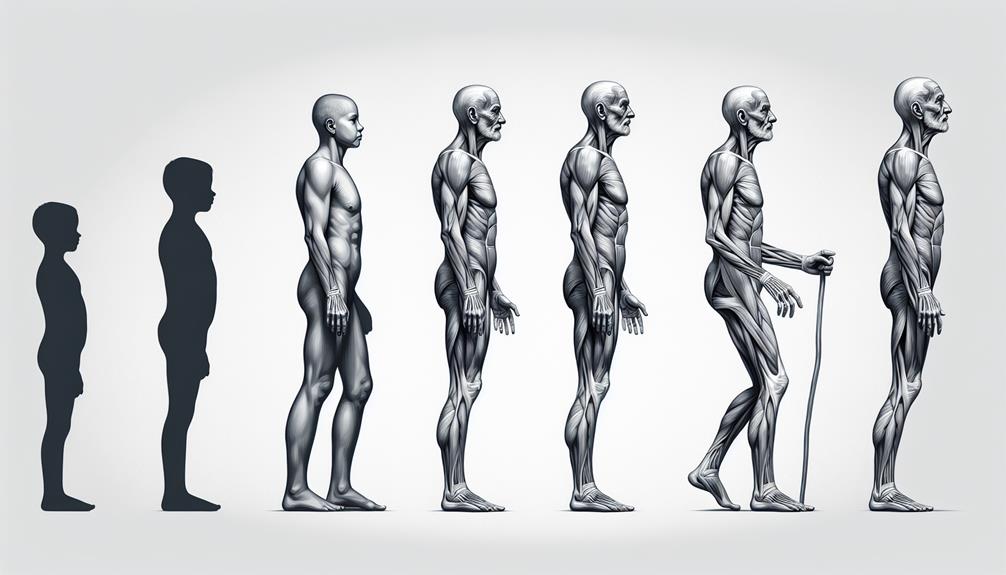
Forget the stereotypes – aging doesn't have to equate to declining health. Memory loss isn't inevitable; cognitive exercises can help. You can build muscle after 50 with strength training and a balanced diet. Stay active to maintain mobility and flexibility; it's crucial. Supplements are beneficial, but quality and consultation matter. Improved cardiovascular health and mental well-being come with exercise. Seniors need quality sleep – deep rest is crucial for health. Weight gain isn't a must; stay active and watch your diet. Social connections combat loneliness and boost emotional well-being. Discover more truths about aging and health to lead a vibrant life.
Key Takeaways
- Aging doesn't guarantee poor health.
- Memory decline is not inevitable with age.
- Strength training is essential for older adults.
- Exercise benefits mental and physical well-being.
- Social connections are vital for combating loneliness.
Aging Equals Declining Health
Contrary to popular belief, aging doesn't necessarily equate to declining health. Healthy habits play a crucial role in maintaining your well-being as you age. One common misconception is that as you get older, it's normal to experience a decline in health. However, research shows that incorporating regular exercise, eating a balanced diet, staying hydrated, and getting enough sleep can significantly impact your overall health and quality of life.
Nutrition myths often perpetuate the idea that aging inevitably leads to health issues. For example, some believe that as you age, you should eat less to account for a slower metabolism. In reality, older adults may need fewer calories, but the focus should be on nutrient-dense foods to meet their dietary requirements. Additionally, there's a misconception that supplements can make up for poor eating habits, but it's essential to prioritize whole foods for optimal nutrition.
Memory Loss Is Inevitable
While memory decline is a common concern as individuals age, it isn't necessarily an inevitable aspect of the aging process. Research suggests that certain lifestyle choices can play a significant role in preventing memory loss. Engaging in cognitive exercises, such as puzzles, reading, or learning a new skill, has been shown to help maintain cognitive function and memory as you age.
Furthermore, staying physically active can also have a positive impact on memory. Regular exercise not only benefits your physical health but can also improve cognitive abilities, including memory. Maintaining a healthy diet rich in fruits, vegetables, whole grains, and lean proteins can provide essential nutrients that support brain health and potentially reduce the risk of memory decline.
In addition to lifestyle factors, staying socially engaged and maintaining strong social connections can help preserve memory function. Regular social interactions and engaging in activities with others can stimulate the brain and contribute to overall cognitive well-being. By incorporating these strategies into your daily routine, you can take proactive steps to support your memory and cognitive health as you age.

You Cant Build Muscle After 50
Building muscle after the age of 50 is achievable through proper exercise and nutrition. Strength training is a crucial component in building muscle mass, regardless of age. Research indicates that older adults can experience significant gains in muscle strength and size when engaging in regular resistance training. This form of exercise not only helps increase muscle mass but also improves bone density, balance, and overall functional capacity, reducing the risk of falls and fractures commonly associated with aging.
Contrary to popular belief, age doesn't prevent you from building muscle. As long as you engage in appropriate resistance exercises and follow a balanced diet rich in protein, you can promote muscle growth and maintain a strong, healthy body. Additionally, dispelling nutrition myths surrounding aging is essential. Consuming an adequate amount of protein, along with essential nutrients, supports muscle repair and growth, contributing to overall physical well-being. Remember, age shouldn't be a barrier to achieving your fitness goals through strength training and proper nutrition.
Aging Means Losing Mobility
Maintaining mobility as you age is crucial for independence and overall well-being. Contrary to the common belief that aging inevitably leads to a decline in mobility, research shows that staying active and focusing on increasing flexibility can help maintain and even improve mobility as you grow older. Regular physical activity, such as walking, swimming, or yoga, can help enhance muscle strength, joint flexibility, and balance, all of which are essential for preserving mobility.
Studies have demonstrated that engaging in activities like strength training can help counteract the muscle loss that often accompanies aging. By challenging your muscles through resistance exercises, you can maintain muscle mass and strength, supporting your ability to move freely. Additionally, stretching exercises can improve flexibility, making it easier to perform daily tasks and reduce the risk of injuries.
Incorporating a variety of physical activities into your routine, focusing on both strength and flexibility, is key to promoting mobility as you age. Remember, staying active is the key to defying the misconception that aging means losing mobility.
Supplements Are Essential for Aging Well
To age well, consider the role of supplements in supporting your health and vitality. When it comes to aging gracefully, supplements can be a helpful addition to your routine. However, it's essential to remember that supplements are meant to complement a healthy diet and lifestyle, not replace them entirely.

Here are some key points to keep in mind regarding supplements for aging well:
- Nutrition choices: Focus on getting essential nutrients from whole foods whenever possible before turning to supplements.
- Lifestyle habits: Regular exercise, proper hydration, and sufficient sleep play a significant role in overall health and may impact the effectiveness of supplements.
- Consult a healthcare provider: Before starting any new supplement regimen, consult with a healthcare professional to ensure it aligns with your individual health needs.
- Quality matters: When selecting supplements, opt for reputable brands that undergo testing for purity and potency to ensure you're getting a safe and effective product.
Mental Decline Is Unavoidable
Mental decline, a natural part of the aging process, is often perceived as unavoidable, but there are measures individuals can take to potentially mitigate its effects. Cognitive training has shown promise in enhancing cognitive function among older adults. Engaging in activities that challenge the brain, such as puzzles, learning new skills, or playing musical instruments, can help maintain mental sharpness.
Moreover, adopting a healthy lifestyle can also play a crucial role in preserving cognitive abilities. Regular physical exercise has been linked to improved cognitive function and a reduced risk of cognitive decline. Additionally, following a balanced diet rich in fruits, vegetables, whole grains, and healthy fats can support brain health.
It's important to note that mental decline isn't entirely inevitable. By incorporating cognitive training exercises into your routine and embracing a healthy lifestyle, you can potentially slow down the cognitive aging process and maintain mental acuity as you grow older.
Its Too Late to Start Exercising
Starting an exercise routine later in life can still offer numerous health benefits and improve overall well-being. It's never too late to start prioritizing your physical health through regular physical activity. Here are a few key points to consider:
- Improved cardiovascular health: Engaging in exercise, even if you haven't done so before, can significantly boost your heart health by strengthening your heart muscle and enhancing circulation.
- Enhanced mental well-being: Exercise has been linked to reduced stress, anxiety, and depression, promoting better overall mental health and cognitive function.
- Better weight management: Regular physical activity can help you maintain a healthy weight, which in turn reduces the risk of various chronic conditions such as diabetes and heart disease.
- Increased longevity: Research consistently shows that staying active, regardless of age, is associated with longevity benefits, helping you live a longer and healthier life.
Seniors Need Less Sleep
Contrary to common belief, seniors do not necessarily need less sleep as they age. Sleep patterns can shift with age, but the amount of sleep needed remains relatively constant throughout adulthood. The key lies in understanding seniors' needs when it comes to sleep. While it's true that older adults may experience changes in their sleep architecture, such as spending more time in lighter stages of sleep, the importance of a good night's rest remains unchanged.

To shed more light on this topic, let's look at some common myths and facts about seniors' sleep needs:
| Myths | Facts |
|---|---|
| Seniors need less sleep as they age | The amount of sleep needed remains relatively constant |
| Older adults don't require as much deep sleep | Deep sleep is crucial for overall health and cognitive function |
| Napping is harmful for seniors | Short naps can actually improve alertness and mental performance |
Understanding these myths and facts can help seniors and their caregivers make informed decisions about sleep habits and overall health.
Aging Leads to Weight Gain
As individuals age, there's a common misconception that aging inevitably leads to weight gain. However, this belief isn't entirely accurate. Several factors contribute to weight changes as people grow older.
- Hormonal Changes: Hormonal fluctuations, particularly during menopause for women and andropause for men, can impact weight distribution and metabolism.
- Metabolism Slowdown: Metabolism tends to slow down with age, leading to fewer calories being burned at rest. This can result in weight gain if dietary habits aren't adjusted accordingly.
- Muscle Loss: Aging often leads to a decrease in muscle mass, which can lower the body's calorie-burning capacity and contribute to weight gain.
- Physical Activity Levels: As people age, they may become less active due to various factors such as joint issues or decreased energy levels. Reduced physical activity can lead to weight gain if calorie intake remains constant.
Understanding these factors can help individuals make informed decisions about their diet, exercise, and overall lifestyle to maintain a healthy weight as they age.
Loneliness Is a Natural Part of Aging
Loneliness, though commonly associated with aging, isn't an inherent or inevitable aspect of the aging process. Maintaining social connections as you age is crucial for your emotional well-being. Research has shown that older adults who actively engage in social activities, whether through community groups, volunteering, or spending time with family and friends, are less likely to experience feelings of loneliness.
Social connections provide a sense of belonging and support, which can help combat loneliness and promote overall mental health. Studies have demonstrated that individuals with strong social networks tend to have better cognitive function and a lower risk of developing mental health issues such as depression and anxiety.

It's essential to prioritize nurturing relationships and seeking out opportunities for social interaction as you age. Engaging in activities that bring you joy and connecting with others who share your interests can significantly impact your emotional well-being and help prevent feelings of loneliness commonly associated with aging. Remember, loneliness isn't a natural part of aging; it's a challenge that can be overcome with proactive efforts to stay connected.
Conclusion
In conclusion, debunking these common myths about aging and health is like shining a light on the shadows of misinformation. By separating fact from fiction, you can navigate the journey of aging with clarity and confidence.
Remember, just as a compass guides a traveler through uncharted territory, accurate information can be your guide to thriving in your later years.
So, arm yourself with knowledge and embrace the possibilities that come with each passing year.



